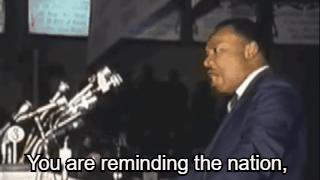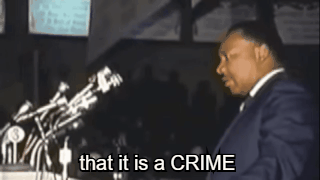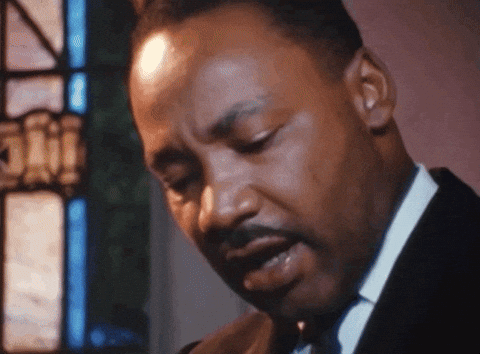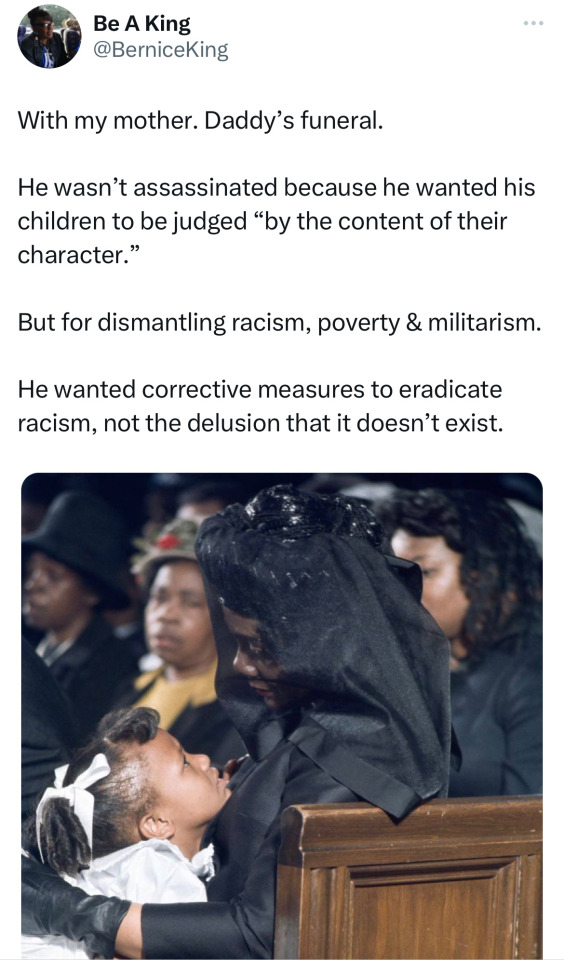#Mlk
Explore tagged Tumblr posts
Text

Text: Don’t act like everyone loved my father. He was assassinated. A 1967 poll reflected that he was one of the most hated men in America. Most hated. Many who quote him now and evoke him to deter justice today would likely hate, and may already hate, the authentic King.
18K notes
·
View notes
Text

“Again we have deluded ourselves into believing the myth that Capitalism grew and prospered out of the Protestant ethic of hard work and sacrifice. The fact is that capitalism was built on the exploitation and suffering of black slaves and continues to thrive on the exploitation of the poor – both black and white, both here and abroad.”
— MLK, “The three evils of society,” 1967
1K notes
·
View notes
Text
Toward the end of the Reconstruction era, something very significant happened. That is what was known as the Populist Movement. The leaders of this movement began awakening the poor white masses and the former Negro slaves to the fact that they were being fleeced by the emerging Bourbon interests. Not only that, but they began uniting the Negro and white masses into a voting bloc that threatened to drive the Bourbon interests from the command posts of political power in the South.
To meet this threat, the southern aristocracy began immediately to engineer this development of a segregated society. I want you to follow me through here because this is very important to see the roots of racism and the denial of the right to vote. Through their control of mass media, they revised the doctrine of white supremacy. They saturated the thinking of the poor white masses with it, thus clouding their minds to the real issue involved in the Populist Movement. They then directed the placement on the books of the South of laws that made it a crime for Negroes and whites to come together as equals at any level. And that did it. That crippled and eventually destroyed the Populist Movement of the nineteenth century.
If it may be said of the slavery era that the white man took the world and gave the Negro Jesus, then it may be said of the Reconstruction era that the southern aristocracy took the world and gave the poor white man Jim Crow. He gave him Jim Crow. And when his wrinkled stomach cried out for the food that his empty pockets could not provide, he ate Jim Crow, a psychological bird that told him that no matter how bad off he was, at least he was a white man, better than the black man. And he ate Jim Crow. And when his undernourished children cried out for the necessities that his low wages could not provide, he showed them the Jim Crow signs on the buses and in the stores, on the streets and in the public buildings. And his children, too, learned to feed upon Jim Crow, their last outpost of psychological oblivion.
-Martin Luther King, Jr., March 25, 1965, Selma to Montgomery March, State Capitol steps, Montgomery, Alabama (x)
#mlk#mlk jr day#mlk jr#martin luther king jr#martin luther king quotes#segregation#racism#divide and conquer
699 notes
·
View notes
Text
January 20th this year is MLK Day! Today we remember and honor the legacy of Martin Luther King Jr. as a Civil Rights leader and activist. On October 16, 1967, less than 6 months before his assassination, King spoke at the campus stadium at Sacramento State College (now known today as California State University, Sacramento) on the subject of inequalities in education and economic justice for the lower class in the United States in a campaign later called the “Poor People’s Campaign of 1968.” About 6,000 people attended this speech.
For today, Jared discussed MLK’s speech in Sacramento and letterpress printed a quote from MLK in 1963. The quote is, “Injustice anywhere is a threat to justice everywhere... Whatever affects one directly, affects all indirectly.” This was typeset in 30 point Caslon font. This was printed with black rubber base ink using our Washington hand press, which was made in 1852.
#mlk day#mlk#museum#sacramento#history#printing#art#letterpress#typography#printmaking#asmr#old sacramento
635 notes
·
View notes
Photo
"All labor has dignity. You are reminding the nation, that it is a CRIME for people to live in this RICH nation, and receive starvation wages!"





Martin Luther King speaking to striking workers in Memphis
#mlk#martin luther king jr#workers rights#worker's rights#labour#labour rights#labor rights#wealth inequality#starvation wages
62K notes
·
View notes
Text

280 notes
·
View notes
Text

Martin Luther King Jr.
#martin luther king jr#mlk#there must be a restructuring of the architecture of our society where values are concerned#civil rights#human rights#blm#01/15#birth date#04/04#death date#01/20#mlk day
255 notes
·
View notes
Text
And Trump just promised, on the day we memorialize Dr. King, to make the United States “color blind.” We must mourn once again, and in our sorrow, find strength.

Be A King
@BerniceKing
"With my mother. Daddy's funeral.
He wasn't assassinated because he wanted his children to be judged "by the content of their character."
But for dismantling racism, poverty & militarism.
He wanted corrective measures to eradicate racism, not the delusion that it doesn't exist."
(Alt text included in image).
https://x.com/berniceking/status/1746661202061586854
6K notes
·
View notes
Text

View of Martin Luther King, Jr. at Cobo Hall in Detroit, Michigan. Stamped on back: "By Detroit News staff photographer Batten. Reporter: Strickland. Finished by: [blank]." Typed on back: "Cobo Hall, Dr. Martin Luther King."
Burton Historical Collection, Detroit Public Library
236 notes
·
View notes
Text

The Dream Never Dies
Washington D.C.
Bob Cronk
#mlk#mlk jr#washington dc#mlk day#bob cronk#photographers on tumblr#original photographers#original photography#photography on tumblr#bob cronk photography#monument
192 notes
·
View notes
Text
mlk was a staunch zionist btw
94 notes
·
View notes
Text

“I know that love is ultimately the only answer to mankind's problems” -MLK
(viacarad1016)
#photography#original photography on tumblr#originalphotographers#orignal photography#originalphotography#original photography#original photographers#photographers on tumblr#photo tumblr#photo on tumblr#photographersontumblr#snow vibes#snowstorm#morning#sunrise#water#shoreline#pinkskies#mlk jr#mlk#mlk day
91 notes
·
View notes
Text

LETTERS FROM AN AMERICAN
January 19, 2025
Heather Cox Richardson
Jan 19, 2025
You hear sometimes, now that we know the sordid details of the lives of some of our leading figures, that America has no heroes left.
When I was writing a book about the Wounded Knee Massacre, where heroism was pretty thin on the ground, I gave that a lot of thought. And I came to believe that heroism is neither being perfect, nor doing something spectacular. In fact, it’s just the opposite: it’s regular, flawed human beings choosing to put others before themselves, even at great cost, even if no one will ever know, even as they realize the walls might be closing in around them.
It means sitting down the night before D-Day and writing a letter praising the troops and taking all the blame for the next day’s failure upon yourself in case things went wrong, as General Dwight D. Eisenhower did.
It means writing in your diary that you “still believe that people are really good at heart,” even while you are hiding in an attic from the men who are soon going to kill you, as Anne Frank did.
It means signing your name to the bottom of the Declaration of Independence in bold print, even though you know you are signing your own death warrant should the British capture you, as John Hancock did.
It means defending your people’s right to practice a religion you don’t share, even though you know you are becoming a dangerously visible target, as Sitting Bull did.
Sometimes it just means sitting down, even when you are told to stand up, as Rosa Parks did.
None of those people woke up one morning and said to themselves that they were about to do something heroic. It’s just that when they had to, they did what was right.
On April 3, 1968, the night before the Reverend Doctor Martin Luther King Jr. was assassinated by a white supremacist, he gave a speech in support of sanitation workers in Memphis, Tennessee. Since 1966, King had tried to broaden the Civil Rights Movement for racial equality into a larger movement for economic justice. He joined the sanitation workers in Memphis, who were on strike after years of bad pay and such dangerous conditions that two men had been crushed to death in garbage compactors.
After his friend Ralph Abernathy introduced him to the crowd, King had something to say about heroes: “As I listened to Ralph Abernathy and his eloquent and generous introduction and then thought about myself, I wondered who he was talking about.”
Dr. King told the audience that if God had let him choose any era in which to live, he would have chosen the one in which he had landed. “Now, that’s a strange statement to make,” King went on, “because the world is all messed up. The nation is sick. Trouble is in the land; confusion all around…. But I know, somehow, that only when it is dark enough, can you see the stars.” Dr. King said that he felt blessed to live in an era when people had finally woken up and were working together for freedom and economic justice.
He knew he was in danger as he worked for a racially and economically just America. “I don’t know what will happen now. We’ve got some difficult days ahead. But it doesn’t matter…because I’ve been to the mountaintop…. Like anybody, I would like to live a long life…. But I’m not concerned about that now. I just want to do God’s will. And He’s allowed me to go up to the mountain. And I’ve looked over. And I’ve seen the promised land. I may not get there with you. But I want you to know tonight, that we, as a people, will get to the promised land!”
People are wrong to say that we have no heroes left.
Just as they have always been, they are all around us, choosing to do the right thing, no matter what.
Wishing you all a day of peace for Martin Luther King Jr. Day 2025.
LETTERS FROM AN AMERICAN
HEATHER COX RICHARDSON
#Heather Cox Richardson#Letters From An American#heroes#history#Martin Luther King Jr. Day#Martin Luther King Jr.#MLK
64 notes
·
View notes
Text

“Why is equality so assiduously avoided? Why does white America delude itself, and how does it rationalize the evil it retains? The majority of white Americans consider themselves sincerely committed to justice for the Negro. They believe that American society is essentially hospitable to fair play and to steady growth toward a middle-class Utopia embodying racial harmony. But unfortunately this is a fantasy of self-deception and comfortable vanity.”
- Dr. Martin Luther King, Jr. - “Where do we go from here,” 1967
#mlk#mlk jr.#dr. martin luther king jr.#dr. martin luther king#mlk day#mlk quotes#civil rights#racism#racial inequality#racial injustice
85 notes
·
View notes
Text
MLK on Reparations
#mlk#martin luther king jr#dr martin luther king jr#black history#blacklivesmatter#black lives matter#reparations#black people#racial injustice
61 notes
·
View notes
